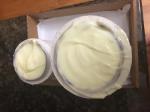Oily, greasy soap
by Hilde
(Norway)
I have made a couple of cold process soap batches the last few days, and both of them went wrong. They turned out very soft, oily and greasy after 24 hours cure time.
I am confident I have measured correctly and have put the oils and lye water together at app. 40 celsius degrees... The recipe is from Tatyana Hill's book "Homemade soap", and I have tried the same recipe many times. I have never had problems with it before. It contains coconut oil, sunflower oil, olive oil and cinnamon EO...
Could it be that the lye was old? There was a few lumps in the bottle, otherwise it seemed okay.
There is no expiry date on the bottle, so it's hard to tell how long it has been in the shop.
Answer:
If this recipe has worked for you in the past, then it may be an issue with the ingredients or with the stirring.
Oily, greasy, soft soap can sometimes be the result of a false trace. This can occur if you stick blend the soap right up to the point of pouring. Always hand stir the soap for a couple of minutes if you can before putting in the essential oils and pouring into your soap mold.
Cinnamon essential oil will also really thicken up the soap so it should definitely be added last.
My lye sometimes will have lumps in it but I have not found this to ruin my batches. I have heard of instances where lye seems to have been the culprit of failed batches so it wouldn't hurt to get a new sample to try out.
Lye does not have an expiry date to the best of my knowledge. I think what happens is that opening and closing the bottle repeatedly can introduce too much moisture into the lye. Lye attracts moisture like crazy and the bottle should never be left open for longer than necessary.
Lastly, make sure you are using the same water source as in the past. High mineral content in water can have some undesired effects on the soap process.
Good luck,
Cathy
Comments for Oily, greasy soap
|
||
|
||
|
||
|
||
|
||

